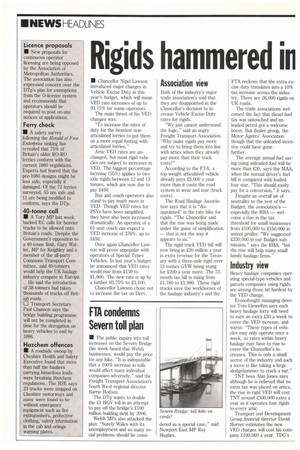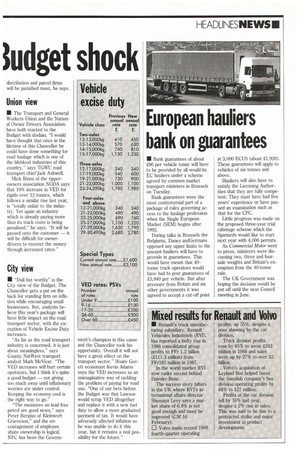Rigids hammered in ludget shock
Page 6

Page 7

If you've noticed an error in this article please click here to report it so we can fix it.
• Chancellor Nigel Lawson introduced major changes in Vehicle Excise Duty in this year's budget, which will mean VED rate increases of up to 93.75% for some operators.
The main thrust of his VED changes was: "To increase the rates of duty for the heaviest nonarticulated lorries to put them on a more equal footing with articulated lorries."
Artic VED rates are unchanged, but most rigid vehicles are subject to increases in VED. The biggest percentage increase (55%) applies to twoaxle rigids between 12 and 13 tonnes, which are now due to pay £450.
Bus and coach operators also stand to pay much more in VED. Though VED rates for PSVs have been simplified, they have also been increased dramatically. An operator of a 61-seat coach can expect a VED increase of 376%, up to £450.
Once again Chancellor Lawson will prove unpopular with operators of Special Types Vehicles. In last year's budget he announced that VED rates would rise from 2130 to £1,600. The new rate is up by a further 93.75% to £3,100.
Chancellor Lawson chose not to increase the tax on Derv.
Association view
Both of the industry's major trade association's said that they are disappointed in the Chancellor's decision to increase Vehicle Excise Duty rates for rigids.
"We just cannot understand the logic," said an angry Freight Transport Association. "Why make rigids pay more and try to bring them into line with artics when they already pay more than their track costs?"
According to the FTA, a top-weight articulated vehicle already pays 23,000 a year more than it costs the road system in wear and tear (track costs).
The Road Haulage Association says that it is "disappointed" in the rate hike for rigids. "The Chancellor said that the rise was being made under the guise of simplification — that is not the way it appears to us."
The rigid truck VED bill will now bring in 220 million a year in extra revenue for the Treasury with a three-axle rigid over 23 tonnes GVW being stung for £200 a year more. The 12month tax bill is rising from £1,780 to 21,980. These rigid trucks save the workhorses of the haulage industry's and the FTA reckons that the extra excise duty translates into a 10% tax increase across the industry. There are 26,000 rigids on UK roads.
The trade associations welcomed the fact that diesel fuel tax was untouched and.unleaded petrol got a welcome boost. But dealer group, the Motor Agents' Association though that the unleaded incentive could have gone further.
The average annual fuel saving using unleaded fuel will be more than £30, says the MAA, when the normal driver's fuel bill is compared with leaded four star. "This should easily pay for a conversion," it says.
Despite an overall air of neutrality to the rest of the Budget, the association's — especially the RHA — welcome a rise in the tax threshold for small businesses from 2100,000 to £150,000 in annual profits: "We suggested 2250,000 in our Budget submission," says the RHA, "but the rise will help many small family haulage firms."
Industry view
Heavy haulage companies operating special-type vehicles and parcels companies using rigids are among those hit hardest by the VED change.
Econofreight managing director Tom Llewellyn says each heavy haulage lorry will need to earn an extra 230 a week to cover the VED increase, and warns: "These types of vehicles may only operate once a week, so rates within heavy haulage may have to rise to cover the Chancellor's increases. This is only a small sector of the industry and such a move is like taking a large sledgehammer to crack a nut."
TNT boss Alan Jones says although he is relieved that no extra tax was placed on artics, the rise in rigid VED will cost TNT around £300,000 extra a year as it operates four rigids to every artic.
Transport and Development Group financial director David Homer estimates the new VED charges will cost his company £100,000 a year. TDG's distribution and parcel firms will be punished most, he says.
Union view
• The Transport and General Workers Union and the National Owner Drivers Association have both reacted to the Budget with disdain. "I would have thought that once in the lifetime of this Chancellor he could have done something for road haulage which is one of the lifeblood industries of this country," says TGWU road transport chief Jack Ashwell.
Mick Binns of the tipperowners association NODA says that 10% increase in VED for rigids over 12 tonnes, which follows a similar rise last year, is "totally unfair to the industry. Yet again an industry which is already paying more than its track costs is being penalised," he says. "It will be passed onto the customer — it will be difficult for ownerdrivers to recover the money through increased rates."
City view
• "Dull but worthy" is the City view of the Budget. The Chancellor gets a pat on the back for standing firm on inflation while encouraging small businesses. But, analysts believe this year's package will have little impact on the road transport sector, with the exception of Vehicle Excise Duty increases.
"As far as the road transport industry is concerned, it is just about meaningless," says County NatWest transport analyst Mark McVicar. "The VED increases will hurt certain operators, but I think it's quite a good budget — not giving too much away until inflationary worries are under control. Keeping the economy cool is the right way to go."
"The measures on lead free petrol are good news," says Peter Bergius of Kleinwort Grieveson," and the encouragement of employee share ownership is logical. NEC has been the Govern
ment's champion in this cause and the Chancellor took his opportunity. Overall it will not have a great effect on the transport sector." Hoare Govett economist Kevin Adams sees the VED increases as an unimaginative way of tackling the problem of paying for road use. "One of our bets before the Budget was that Lawson would scrap VED altogether and replace it with a new fuel duty to allow a more graduated payment of tax. It would have adversely affected inflation so he was unable to do it this year, but it remains a real possibility for the future."








































































































































